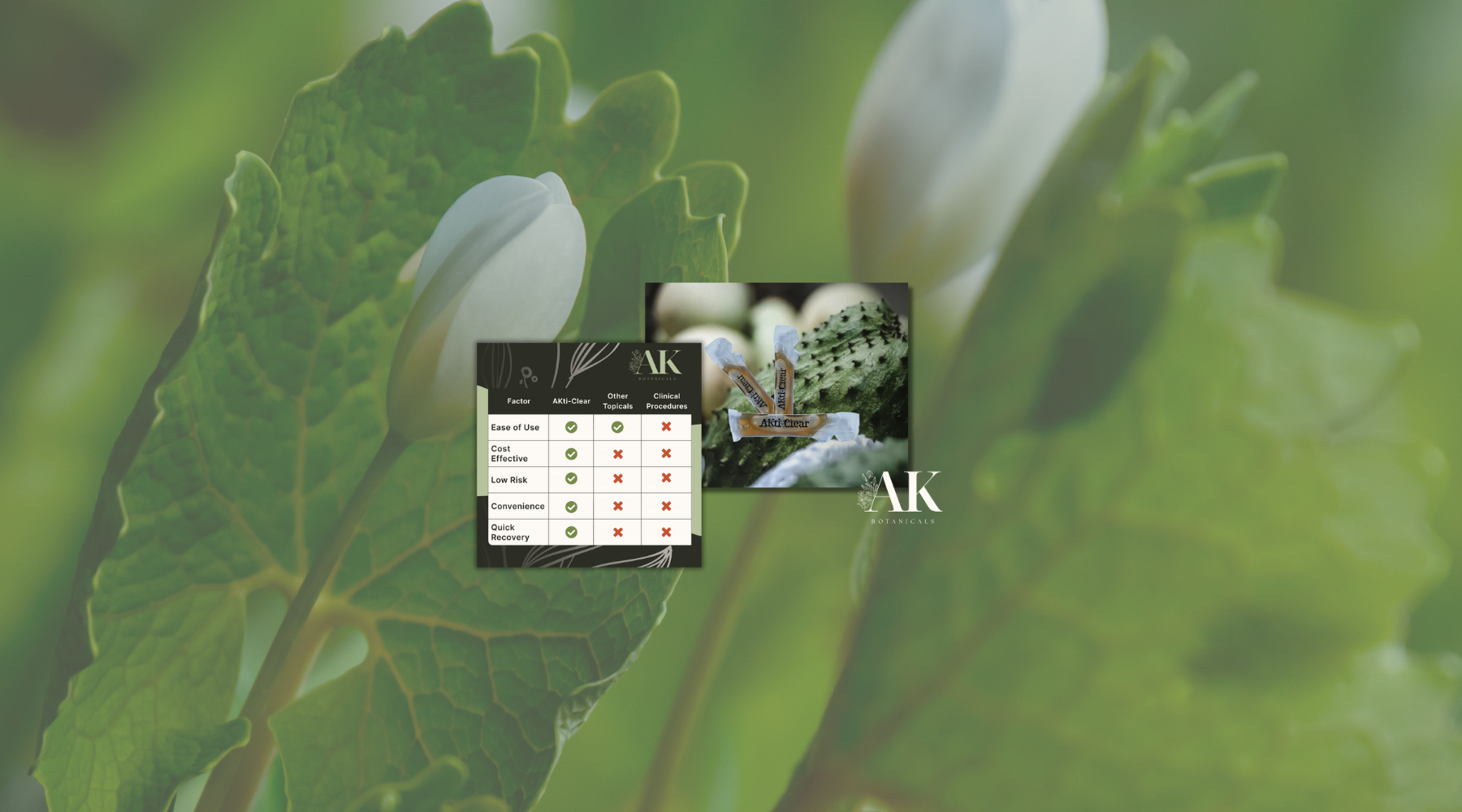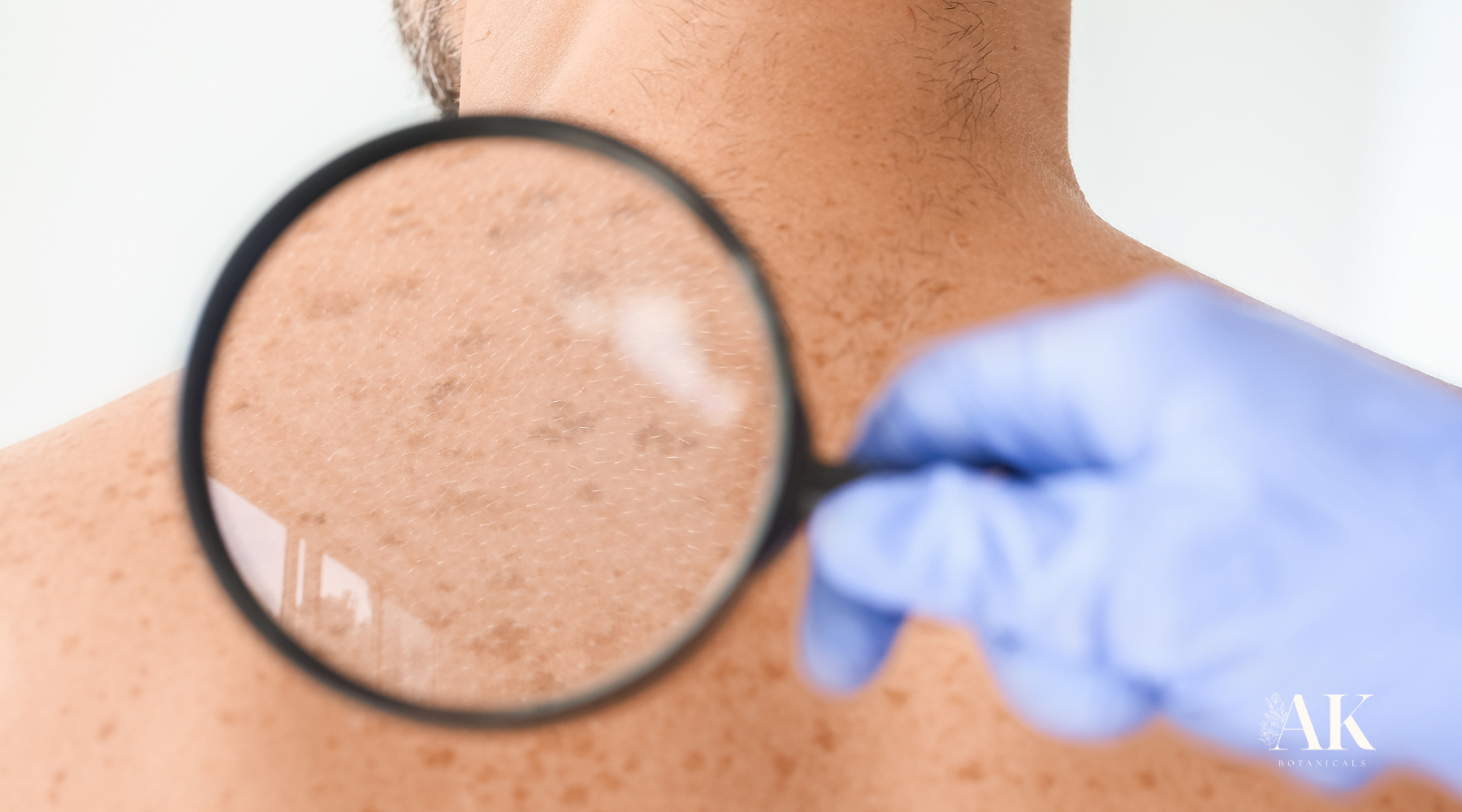
How AKti-Clear Compares to Other Topical Options for Actinic Keratosis
In recent years, there has been a noticeable shift toward holistic and plant-based remedies in healthcare, driven by a growing preference for natural and sustainable treatment options. This trend reflects a desire to support the body’s innate healing abilities with minimally invasive solutions. For those managing Actinic Keratosis (AK) —a skin condition often caused by prolonged sun exposure—integrating holistic treatments into their routine can provide a gentler yet effective approach.
AKti-Clear: A Natural Solution for Actinic Keratosis
AKti-Clear embodies this shift by offering a plant-based, botanically infused remedy for AK. What sets AKti-Clear apart is its simplicity, natural formulation, and ease of use, making it a standout option for those seeking a more holistic approach to skin health.
Application:
Used at home.
Frequency:
Just 3 applications.
Type:
Botanically Infused.
Availability:
Over-the-counter, no prescription needed.
Benefits:
Easy to use with natural ingredients; accessible and convenient.
Unlike other options, AKti-Clear requires only three applications, making it a faster alternative compared to traditional methods. Its Botanically Infused approach offers a unique option in the landscape of Actinic Keratosis care, appealing to those who prioritize natural health and non-invasive options.

AKti-Clear vs. Other Actinic Keratosis Topical Solutions: A Natural and Convenient Option
Diclofenac Sodium Gel (Voltaren Gel): Comparing Anti-Inflammatory Treatment Options
Application:
Applied twice a day
Duration:
2–3 months
Type:
Nonsteroidal anti-inflammatory gel
Availability:
Prescription required
Side Effects:
Skin reactions such as redness, itching, peeling, or dry skin
Benefits:
Reduces inflammation; effective for larger areas
Diclofenac Sodium Gel is a nonsteroidal anti-inflammatory gel used for treating Actinic Keratosis. It is effective in reducing inflammation and treating larger areas but requires a prescription. Side effects can include skin reactions, which contrasts with AKti-Clear’s natural and less irritating approach. For patients seeking a topical medication, Diclofenac offers an alternative, though with a more involved application process.
5-Fluorouracil (5-FU) Cream (Fluorac Cream): A Comparison with Topical Chemotherapy for Actinic Keratosis
Application:
Applied once or twice a day
Duration:
2–4 weeks
Type:
Topical chemotherapy
Availability:
Prescription required
Side Effects:
Redness, swelling, significant discomfort; not recommended for pregnant women
Benefits:
Highly effective in destroying abnormal cells
5-Fluorouracil cream is a potent topical chemotherapy option for Actinic Keratosis. It is highly effective in destroying abnormal cells but comes with significant side effects, including discomfort and contraindications for pregnant women. This contrasts with AKti-Clear, which offers a gentler, Botanically Infused alternative. The additional adherence required with 5-FU may be challenging for some patients, especially those with sensitive skin.
Imiquimod Cream (Aldara or Zyclara Cream): Boosting Immune Response for Treating Actinic Keratosis
Application:
Applied once or twice a week
Duration:
Variable, often for several weeks
Type:
Immune response modifier
Availability:
Prescription required
Side Effects:
Redness, crusting, and irritation
Benefits:
Enhances immune response to target abnormal cells; especially useful on the face
Imiquimod cream works by boosting the body's immune response to treat Actinic Keratosis. While effective, especially for facial lesions, it requires a prescription and may cause redness and irritation. AKti-Clear’s ease of use and natural formulation present an attractive alternative, especially for those who prefer a less invasive treatment approach.
Tirbanibulin Ointment: A Novel Approach for Actinic Keratosis Treatment
Application:
Applied as directed, often daily
Duration:
Typically 5 days
Type:
Novel microtubule inhibitor
Availability:
Prescription required
Side Effects:
Local skin reactions like redness, irritation, and peeling
Benefits:
Effective for face and scalp lesions; shorter treatment duration
Tirbanibulin offers a new treatment approach for Actinic Keratosis. It is effective for lesions on the face and scalp with a shorter treatment duration. However, it requires a prescription and can cause local skin reactions, unlike AKti-Clear which is available over-the-counter and has a more straightforward application protocol. This new therapy might appeal to those looking for an additional option in their treatment regimen.
Comparing Surgical Treatments for Actinic Keratosis
Cryotherapy (Cryosurgery)
Description:
Freezes Actinic Keratosis lesions with liquid nitrogen.
Possible Side Effects:
Blistering, skin discoloration, scarring, pain, and risk of infection.
Benefits:
Effective for individual lesions, quick procedure.
Curettage and Electrosurgery
Description:
Scrapes off the lesion with a curette and uses electrosurgery to destroy remaining cells.
Possible Side Effects:
Scarring, discoloration, infection, bleeding, and prolonged healing.
Benefits:
Effective for removing lesions and residual abnormal cells.
Laser Therapy (Laser Surgery)
Description:
Uses a focused beam of light to remove abnormal cells.
Possible Side Effects:
Scarring, changes in skin color, pain, infection risk, and prolonged recovery.
Benefits:
Precise removal of surface lesions.
Photodynamic Therapy (PDT)
Description:
Applies a photosensitizing agent activated by light to destroy abnormal cells.
Possible Side Effects:
Redness, swelling, pain, crusting, increased sensitivity to sunlight, and risk of infection.
Benefits:
Effective for widespread lesions, combines therapy with light activation.
Excisional Surgery
Description:
Removes the entire lesion along with surrounding tissue using a scalpel.
Possible Side Effects:
Scarring, bleeding, pain, infection risk, and prolonged healing.
Benefits:
Ensures complete removal of lesions.
Dermabrasion
Description:
Removes top layers of skin to address Actinic Keratosis and promote new skin growth.
Possible Side Effects:
Scarring, redness, infection, changes in skin texture or pigmentation, and prolonged recovery.
Benefits:
Removes lesions and encourages healthy skin regeneration.
Why AKti-Clear Stands Out in Managing Actinic Keratosis
AKti-Clear presents a unique option among Actinic Keratosis solutions due to its natural formulation, ease of use, and rapid action. Compared to other methods:
AKti-Clear can be used at home, eliminating the need for clinical visits.
It requires only three applications, offering a quicker solution than many other treatments.
Its Botanically Infused approach provides a natural alternative to pharmaceutical and surgical options.
By choosing a holistic, plant-based approach, individuals with Actinic Keratosis can benefit from a solution that harmonizes with the body's natural processes, supporting healing in a way that is both effective and considerate of overall well-being.
Actinic Keratosis (AK) is a precancerous skin condition caused by prolonged UV exposure. With various treatments available, it's important to understand how different options compare. Always consult a dermatologist. Early diagnosis and treatment can save lives.




